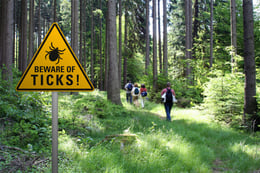Ticks may be small, but their bite can pack a big punch. Living in a hotspot for tick activity, it’s important for Massachusetts residents to know about the health risks posed by these nasty nuisances.
 Common tick-borne diseases include Lyme disease, babesiosis, and anaplasmosis; less common but still seen in our area are tularemia, Rocky Mountain spotted fever, and Powassan virus. Here, we’ll focus on the top three threats.
Common tick-borne diseases include Lyme disease, babesiosis, and anaplasmosis; less common but still seen in our area are tularemia, Rocky Mountain spotted fever, and Powassan virus. Here, we’ll focus on the top three threats.
Lyme Disease is a bacterial infection spread to humans through the bite of an infected tick, commonly the deer tick. Symptoms include rash, fever, headache, fatigue, and muscle or joint aches. If untreated, the infection can spread to joints, the heart, or the nervous system. Early intervention with antibiotics is key to recovery.
Babesiosis is an infection of the red blood cells, caused by parasites called Babesia. Common symptoms are fever, chills, body aches, headache, fatigue, and loss of appetite. Treatment typically involves antibiotics and antiparasitic drugs.
Anaplasmosis is a disease caused by bacteria transferred via tick bite. Symptoms include fever, chills, headache, muscle aches, nausea, vomiting, and loss of appetite. Similar to Lyme disease, the sooner antibiotic treatment begins, the better.
There are no vaccines for tick-borne diseases, so bite prevention is key. Reduce your risk by learning how to protect yourself from ticks when spending time outdoors and check yourself afterward. If you do find a tick on you, here's how to safely remove it.
For added protection in your yard, call a professional tick control company. Bite back at ticks this season and enroll in a tick and mosquito control plan with Burgess Pest – Select a standalone plan starting at just $49/month, or get coverage for the 10 most common household pests plus ticks and mosquitoes with our most popular plan, the P10+MT. Already on a program? Upgrading to add tick and mosquito control is easy – just give us a call!
Still not sick of info about ticks? Download our free Tick & Mosquito Season Survival Guide.


